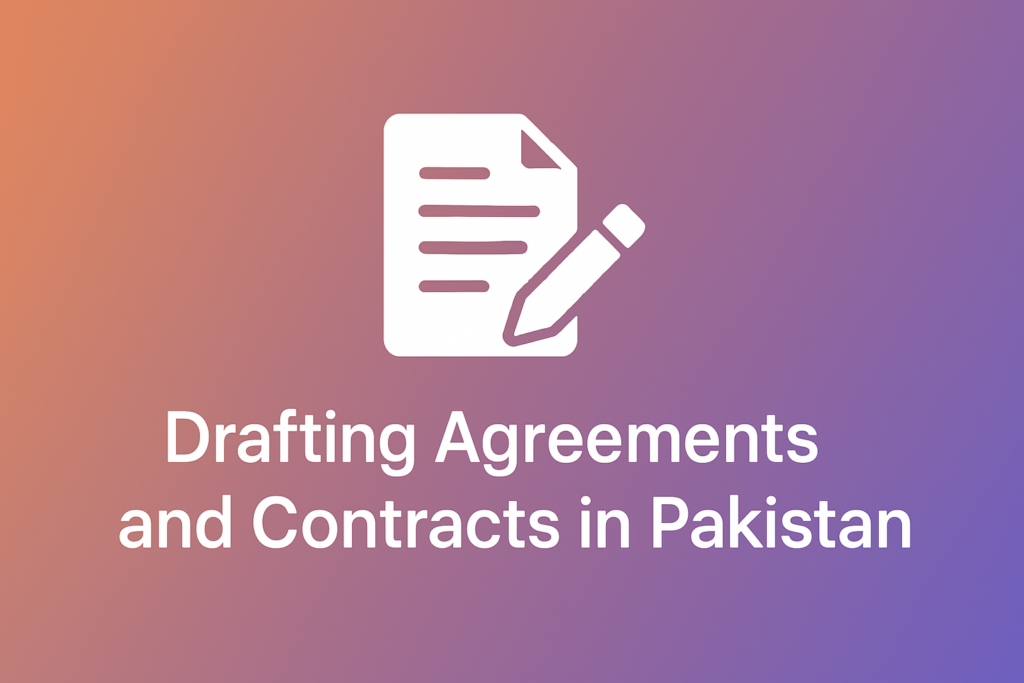Drafting agreements and contracts is crucial in any business. In Pakistan, this process ensures clear terms and legal protection for all parties involved.
Whether you’re a business owner, a freelancer, or entering a partnership, understanding how to draft agreements and contracts is essential. In Pakistan, the legal framework surrounding contracts can be complex. Properly drafted documents help prevent misunderstandings and disputes. They ensure that all parties are on the same page, which is key for smooth business operations.
This blog will guide you through the basics of drafting agreements and contracts in Pakistan. You’ll learn why they matter, the essential elements to include, and tips for creating effective agreements. Stay tuned to make your contracts clear, fair, and legally binding.

Credit: paktaxcalculator.pk
Legal Framework
Drafting agreements and contracts in Pakistan requires a deep understanding of the legal framework. This framework ensures that all agreements comply with national laws and regulations. It also protects the rights of all parties involved.
Contract Act 1872
The Contract Act 1872 is the cornerstone of contract law in Pakistan. This act outlines the rules for forming a valid contract. It specifies the essential elements such as offer, acceptance, and consideration.
Understanding the Contract Act 1872 is crucial for drafting agreements. It helps ensure that all contracts are legally binding. This act also provides guidelines for the performance and enforcement of contracts.
Regulatory Authorities
Various regulatory authorities oversee different sectors in Pakistan. These authorities ensure that industry-specific regulations are followed. For instance, SECP regulates companies and financial markets.
Knowing the relevant regulatory authorities is vital for drafting specific agreements. It ensures compliance with sector-specific laws. This can prevent future legal disputes and enhance contract validity.
Types Of Contracts
Drafting agreements and contracts is crucial in Pakistan. Different types of contracts are used for various purposes. Each contract type addresses specific needs and legal requirements. Understanding the common types can help in creating effective agreements.
Employment Contracts
Employment contracts are agreements between employers and employees. They outline job roles, duties, and benefits. These contracts ensure both parties understand their rights and responsibilities. Employment contracts in Pakistan also include terms of employment, salary, and work hours. They may cover confidentiality and non-compete clauses as well.
Service Agreements
Service agreements are made between service providers and clients. They detail the services to be performed. These contracts specify payment terms, timelines, and service quality standards. Service agreements also address issues like dispute resolution and termination conditions. They ensure clear communication and expectations between both parties.
Partnership Agreements
Partnership agreements are used by business partners. These contracts define the roles and contributions of each partner. They outline profit sharing, decision-making processes, and management duties. Partnership agreements in Pakistan also include clauses for resolving disputes and dissolving the partnership. They provide a clear framework for running a business together.
Essential Elements of Contracts
Drafting agreements and contracts in Pakistan can be quite straightforward if you know the essential elements required. Understanding these elements ensures your contracts are legally binding and enforceable. Let’s dive into the key components that every contract must have.
Offer And Acceptance
One of the first steps in creating a valid contract is the offer. This is where one party proposes terms to the other party. The acceptance of this offer must be clear and unambiguous.
Imagine you are selling your car. You offer it to a friend for Rs. 500,000. If your friend agrees to buy it for that amount, you have a valid offer and acceptance.
Without clear acceptance, there is no agreement. Always ensure both parties are on the same page to avoid misunderstandings.
Consideration
Consideration is what each party brings to the table. It can be money, services, or anything of value. Both parties must exchange something of value for the contract to be valid.
Think about a scenario where you hire a painter. You agree to pay Rs. 20,000 for the job. The painter’s consideration is their painting services, while yours is the payment.
Without consideration, the contract lacks substance. Make sure both sides are getting something valuable from the agreement.
Legal Capacity
Legal capacity means that both parties must have the ability to enter into a contract. This usually means they are of legal age and sound mind.
For example, if you’re signing a contract with a minor or someone who is mentally incapacitated, it might not be enforceable. Always verify the other party’s legal capacity.
Ensuring legal capacity protects you from potential legal issues. It’s crucial to know who you’re dealing with before you sign anything.
Understanding these essential elements can make contract drafting in Pakistan a lot smoother. Have you ever had a contract fall through because of one missing element? Share your experiences and let’s learn together!

Credit: legalinkattorneys.com
Drafting Process
Creating agreements and contracts in Pakistan involves drafting clear, precise documents. This process ensures legal rights and obligations are well-defined for all parties. Accurate drafting is crucial for avoiding future disputes.
Drafting agreements and contracts in Pakistan requires a meticulous process. Attention to detail is crucial to ensure that all parties involved are protected and obligations are clear. Understanding the drafting process can save you from future disputes and legal complications.
Initial Consultation
The drafting process begins with an initial consultation. During this stage, you meet with your legal advisor to discuss your needs and objectives. This consultation helps the lawyer understand what you are trying to achieve with the contract.
You will discuss important elements like the parties involved, the terms and conditions, and any specific clauses you want to include. It’s important to be clear and precise about your expectations. This will help the lawyer draft a contract that meets your needs.
Draft Preparation
Once the initial consultation is complete, the lawyer begins drafting the contract. This stage involves putting all the discussed elements into a formal document. The language used in the contract must be clear and unambiguous to avoid misunderstandings.
The lawyer will draft the contract in a way that protects your interests. They will ensure that all legal requirements are met. This includes compliance with Pakistani laws and regulations.
Review And Revision
After the draft is prepared, it’s time for review and revision. This stage is critical because it allows you to ensure that everything is accurate and meets your expectations. You will go through the draft with your lawyer, checking each clause carefully.
Don’t hesitate to ask questions or request changes. The goal is to create a contract that is fair and comprehensive. You may need to go through several rounds of revisions before the final document is ready.
Have you ever signed a contract without reading it thoroughly? Imagine the consequences of missing a crucial clause. Taking the time to review and revise can prevent such issues.
By following a structured drafting process, you can ensure that your agreements and contracts are solid and enforceable. This careful approach will provide peace of mind, knowing that your interests are well-protected.
Common Clauses
Drafting agreements and contracts in Pakistan often includes common clauses like payment terms, confidentiality, and dispute resolution. These clauses ensure clarity and protect the interests of all parties involved. Clear language is essential for effective legal documentation.
Drafting agreements and contracts in Pakistan can be a meticulous task, but understanding the common clauses can make the process smoother. These clauses ensure that both parties are protected and clear on their responsibilities. Let’s dive into some essential clauses that you should consider when drafting your agreements.
Confidentiality
Confidentiality clauses are crucial in agreements to safeguard sensitive information. They prevent parties from disclosing any confidential data shared during the course of the contract.
Imagine you are sharing your business secrets with a partner. You wouldn’t want them divulging this information to your competitors, right? Confidentiality clauses help prevent such mishaps.
A practical tip: always specify what constitutes confidential information and the duration of this confidentiality. This avoids any confusion and keeps your data safe.
Dispute Resolution
Disputes can arise in any agreement, and having a clause that outlines how to resolve them is essential. This clause can save you from lengthy and costly legal battles.
Consider adding mediation or arbitration as methods of dispute resolution. These are often quicker and less expensive than going to court.
Think about it: wouldn’t you prefer a simple mediation process over a drawn-out court case? This clause helps you handle disagreements efficiently.
Termination
The termination clause defines how and when an agreement can be ended. It’s necessary to prevent any abrupt termination that might leave you in a difficult position.
For instance, if your partner decides to terminate the agreement unexpectedly, you need to know your rights and remedies. This clause outlines the conditions under which the contract can be terminated and any notice period required.
Ask yourself: do you know what happens if your partner wants to end the agreement suddenly? Having a clear termination clause ensures you’re prepared for such situations.
By understanding these common clauses, you can draft better agreements that protect your interests and provide clarity. Are there any other clauses you find indispensable in your contracts?
Negotiation Tips
Drafting agreements and contracts in Pakistan requires understanding local laws and regulations. Clear terms and precise language help prevent disputes. Always consult legal experts to ensure all clauses are compliant.
When drafting agreements and contracts in Pakistan, the negotiation phase is critical. It sets the foundation for a successful partnership or business arrangement. With the right negotiation tips, you can steer discussions in a positive direction, ensuring both parties reach a mutually beneficial agreement.
Understanding Interests
Understanding the interests of both parties involved is crucial. It’s not just about what you want, but also what the other party needs. This creates a win-win situation.
For instance, if you’re negotiating a supply contract, consider the supplier’s need for consistent orders. This can lead to better pricing or terms for you. Knowing these interests can help you craft proposals that cater to both sides.
Ask yourself: what are the underlying motivations driving each party? This will help you address core concerns effectively.
Effective Communication
Clear and concise communication is key. Misunderstandings can derail negotiations quickly.
Make sure to articulate your points clearly. Avoid jargon that might confuse the other party. Instead, use simple, straightforward language.
Listen actively. Show that you value their input by summarizing what you’ve heard. This builds trust and keeps the dialogue productive.
Compromise Strategies
Compromise is not a sign of weakness. It’s about finding a middle ground that satisfies both parties.
Identify areas where you can be flexible. For example, if delivery timelines are a sticking point, consider offering phased deliveries. This can keep the project on track without overwhelming either party.
Be prepared to give a little to get a lot. Small concessions can lead to significant gains in other areas.
Have you ever considered which aspects of the deal you can compromise on without losing value? This strategic approach can make a huge difference.
—
Negotiating agreements and contracts doesn’t have to be daunting. By focusing on interests, communicating effectively, and being open to compromise, you can create successful and lasting agreements.
Legal Pitfalls
Drafting agreements and contracts in Pakistan can be a challenging task. You need to be aware of common legal pitfalls that can cause problems. Mistakes can lead to disputes, enforcement issues, and financial losses.
Ambiguities
Ambiguous terms can lead to confusion. It’s essential to be clear and specific in your language.
For example, instead of saying “reasonable notice,” specify the exact period, like “30 days’ notice.” Avoid vague descriptions that can be interpreted in different ways.
Have you ever faced issues due to unclear terms in a contract? It’s frustrating. Clarity prevents misunderstandings and ensures all parties are on the same page.
Unenforceable Terms
Some terms might be unenforceable under Pakistani law. Be cautious when drafting clauses that may not hold up in court.
For instance, non-compete clauses need to be reasonable in duration and scope. Overly broad restrictions can be invalidated.
Always double-check with legal experts to ensure that your terms comply with the law. You don’t want to include a clause that won’t be enforceable.
Jurisdiction Issues
Jurisdiction is crucial in contract drafting. Specify which courts will have authority in case of disputes.
Imagine you sign a contract without addressing jurisdiction. Later, you find out you have to litigate in a distant city. It’s inconvenient and costly.
Wouldn’t it be better to agree on a local jurisdiction upfront? It simplifies the process and reduces potential hassles.
Drafting agreements and contracts in Pakistan requires attention to detail. Avoiding legal pitfalls ensures smoother transactions and protects your interests. Have you considered all these aspects in your contracts?

Credit: www.flatworldsolutions.com
Case Studies
Drafting agreements and contracts in Pakistan involves a careful approach. Case studies help understand real-world applications. They provide insights into successful and disputed agreements. Let’s explore some examples.
Successful Contracts
Many contracts in Pakistan achieve their goals smoothly. One such case involves a technology company. They drafted a software development agreement. Both parties met their obligations. The project finished on time and within budget. This success built trust between the companies.
Another example comes from the real estate sector. A developer and an investor signed an agreement. They outlined all terms clearly. This clarity avoided misunderstandings. The project progressed without issues. As a result, both parties benefited financially.
Disputed Agreements
Not all agreements work out as planned. Disputes arise due to unclear terms. One case involved a construction company. They failed to define project milestones. This led to delays and cost overruns. Both parties ended up in court. The judge ruled in favor of the client. Clear terms could have prevented this.
Another dispute involved a supply chain contract. A supplier missed delivery deadlines. The buyer incurred losses. They had to seek legal help. The court resolved the issue. The supplier had to compensate the buyer. Better communication might have avoided this conflict.
Frequently Asked Questions
How Can I Draft A Contract Agreement?
Begin by identifying the parties involved. Define the terms and conditions clearly. Include payment details, timelines, and responsibilities. Add clauses for dispute resolution and termination. Review and sign the agreement.
What Are The Types Of Contracts In Pakistan?
Pakistan has various contract types: express, implied, void, voidable, contingent, and quasi-contracts. Each serves different legal purposes.
What Are The 4 Types Of Agreement?
The four types of agreement are verbal, written, implied, and express agreements. Verbal agreements are spoken. Written agreements are documented. Implied agreements are understood through actions or circumstances. Express agreements are clearly stated, either verbally or in writing.
What Is The Law Of Contract In Pakistan?
The law of contract in Pakistan is governed by the Contract Act, 1872. It outlines rules for making and enforcing agreements.
Conclusion
Drafting agreements and contracts in Pakistan requires careful attention. Understanding local laws is crucial. Clear, concise terms help avoid disputes. Always consult a legal expert for guidance. A well-drafted contract protects all parties involved. It ensures fair, transparent dealings. Take your time to draft properly.
This effort can save future headaches. Ensure every detail is clear and agreed upon. Stay informed and proactive in legal matters. Successful agreements build trust and secure business relationships.



